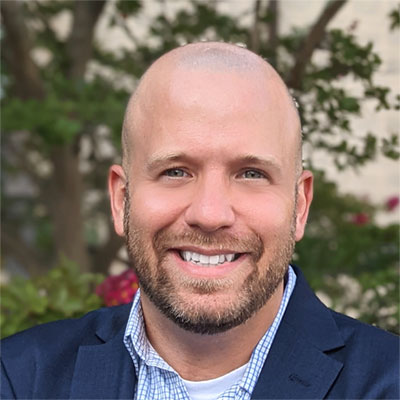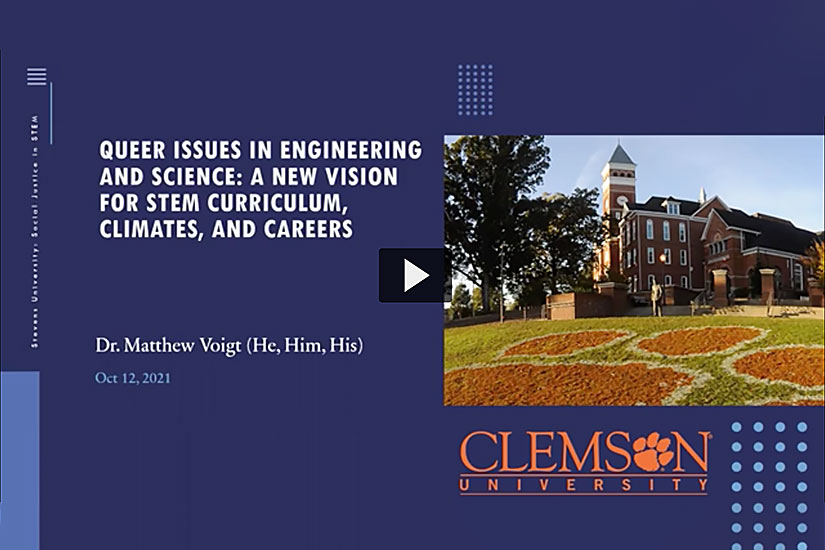Voigt Group
Support Diversity in STEM Education
Matthew Voigt is an assistant professor within Engineering and Science Education whose research interests center around equity, access, and power structures occurring in undergraduate STEM programs. Voigt's current research areas include alternative course pathways and programs to support diversity in undergraduate calculus programs and the role of technology, instructional design, and computer programing to broaden participation by infusing culturally relevant instruction.
Research Projects
Below is a list of ongoing or recently completed research projects Dr. Voigt has conducted in the areas of diversity, equity, and inclusion. His projects exhibit collaborative and often interdisciplinary efforts with scholars at Clemson and other external institutions both domestically and internationally.
Practices and Research on Student Pathways in Education from Community College and Transfer Students to STEM (PROSPECT S-STEM)
Funding Agency: National Science Foundation (DUE 2138066)
Summary: Through a collaborative team of universities and community colleges representing 9 current NSF S-STEM projects, this research hub called PROSPECT S-STEM aims to catalyze co-equitable partnerships between two-year colleges and four-year institutions that empower low-income STEM transfer students. Researchers at Clemson University, East Carolina University, Southeast Community College, the University of Missouri-Kansas City, the University of Nebraska-Lincoln, Augsburg University, the University of North Carolina at Greensboro, the University of Texas at Arlington, and YNOTI Solutions, along with 11 two-year college partners are united by their goal to support domestic undergraduates as they navigate the transfer process. PROSPECT S-STEM will operate as a research and dissemination hub to investigate the nature of two- and four-year colleges’ partnerships and how developing co-equitable partnerships can better support low-income STEM scholars before and after the transition process. There is a need to understand how two- and four-year colleges can effectively establish and maintain partnerships, particularly given inherent power imbalances and often complex cultural norms. Equitable partnerships that support transfer students necessarily involve a range of stakeholders across institutions, including advisors, faculty, financial aid, student affairs professionals, and other administrators involved with transfer policies and programs. PROSPECT S-STEM will examine the nature of these partnerships through a) longitudinal and maximum variation case studies of two- and four-year college partnerships trying to improve STEM transfer student success and b) the establishment of professional learning communities with key stakeholders.
Additional: Prospect-S Project
Achieving Critical Transformation In Undergraduate Programs Of Mathematics (ACT UP math)
Funding Agency: National Science Foundation (ECR 2329538)
Summary: The disparities in achievement and access for marginalized students are well documented, but there remains a lack of attention to what to do with this knowledge and how to measure the impact of improvement efforts beyond pass rates and demographics. While many university mathematics departments value providing diverse, equitable, and inclusive (DEI) student experiences, the faculty often do not have the professional training to engage with DEI work or measure its progress, which can lead to disengagement from these initiatives. ACT UP (a $1.5 million grant from the National Science Foundation) aims to conduct foundational research to identify the mechanisms and structures that best support mathematics stakeholders in making data-informed decisions to promote DEI and critically transform introductory mathematics courses and programs. This project builds on the strength of two prior national studies of introductory mathematics programs, Progress through Calculus and Student Engagement in Mathematics through an Institutional Network for Active Learning (SEMINAL). Three undergraduate mathematics department teams will work in partnership with educational researchers to analyze their local data in comparison to the national sample.
Additional: ACT Up Math
Postdoctoral Research Opportunities and Mentoring for Inclusive STEM Education (PROMISE)
Funding Agency: National Science Foundation (ECR 2329538)
Summary: The PROMISE program will support three postdoctoral fellows focused on equity and social justice in all aspects of science, technology, engineering and mathematics (STEM) education research, practice, and policy at the higher education level. PROMISE Fellows will tap into ongoing research, structures and projects in the Department of Engineering and Science Education (ESED) at Clemson University, as well as other campus- and state-wide resources. They will be mentored by ESED faculty and experts in STEM communication. Through program activities, PROMISE Fellows will build their identity as inclusive STEM educators and incorporate social justice into their own areas of interest and expertise. This project is designed to contribute to STEM education by providing insights to policy-makers on issues of equity and social justice in STEM education at regional, state and federal levels and by preparing the next generation of STEM educators and mentors to emerging scholars from diverse populations.
Additional: ESED PROMISE
Propagating Research Ethics Around Sexual Marginalization And Transgender Issues Conference (PRISMATIC)
Funding Agency: National Science Foundation (ER2 2220269)
Summary: All research that involves undergraduates necessarily includes people with minoritized identities of gender and/or sexuality (including but not limited to lesbian, gay, bisexual, transgender, queer, intersex, asexual, and nonbinary [LGBTQIA+]). However, researchers in science, technology, engineering and mathematics (STEM), STEM education, and higher education fields typically have little to no training related to ethical and responsible research involving LGBTQIA+ participants. There are myriad ethical considerations in such research, from research design and confidentiality to participant recruitment, instrumentation, data collection, data storage, data analysis, and dissemination of findings. Through the NSF’s Ethical and Responsible Research program, PRISMATIC will bring together researchers with expertise in these areas to develop materials and methods to address the awareness gap and promote ethical and responsible education standards that protect LGBTQIA+ participants. Workshops and conferences are an ideal way to engage STEM education researchers and STEM faculty in grappling with ethical and responsible research considerations when involving LGBTQIA+ undergraduates.
Additional: PRISMATIC
Building Interdisciplinary STEM Education Research through Equity and Problem-Based Learning
Funding Agency: Norwegian Directorate for Higher Education and Skills UTFORSK
Summary: This project will establish an institutional partnership between the University of Agder (UiA) and Clemson University based on collaborative research-based activities that promote the development of new knowledge in STEM education and didactics. Our goal is to foster partnership through the development of technology-enhanced problem-based learning with a focus on promoting inclusive and equitable STEM education and elevating students as partners in the development of curricular lessons. The project fosters student and academic staff mobility and networking possibilities through student exchanges and research stays by leveraging the extensive math support expertise at UiA with the implementation of disciplined-based and equity-minded STEM education research experience at Clemson.
Additional: Clemson Norway Exchange
Queer Issues in STEM: Researching the Impact of LGBTQIA+ topics in STEM Environments
Funding Agency: Clemson University Creative Inquiry
Summary: This creative inquiry project aims to explore issues at the intersection of being Queer and in STEM environments. There is emerging research understanding the experiences of Queer STEM students as well as professional societies and student organizations (e.g., oSTEM) that are uniquely designed for LGBTQIA+ students who have an interest in STEM fields. This project involves an initial sequence that provides an overview of Queer Theory, research on Queer issues in STEM, and a focus on designing Queer informed STEM experiences. In the second and third semesters, the project will implement a teaching experiment or research project that examines the impact of Queer informed STEM experiences for undergraduate students. The project is designed for both STEM and non-STEM students and students who identify with being LGBTQIA+ and Allies. Students will have an opportunity to analyze and present data in scholarly presentations and publications.
Student Engagement in Mathematics through an Institutional Network for Active Learning (SEMINAL)
Funding Agency: National Science Foundation (DUE 1624643)
Summary: The goal of this collaborative research grant -- Student Engagement in Mathematics through an Institutional Network for Active Learning (SEMINAL) -- is to better understand how to enact and support institutional change aimed at implementing active learning in undergraduate mathematics learning environments. This project will support ongoing and future efforts focused on increasing student success and persistence in the pre-Calculus to Calculus 2 (P2C2) sequence and will promote the adoption of active learning approaches among member institutions of the Mathematics Teacher Education Partnership (MTEP) organized by the Association of Public and Land-grant Universities (APLU). The project will be carried out in two phases. Phase 1 consists of case studies at six institutions that have a record of successfully implementing Active Learning Mathematics (ALM) and that represent both diverse institutional settings and student demographics. Phase 2 consists of longitudinal, incentivized case studies of nine diverse institutions that set out to infuse active learning in the P2C2 sequence.
Additional: SEMINAL APLU Impact
Progress through Calculus (PtC)
Funding Agency: National Science Foundation (DUE IUSE #1430540)
Summary: Progress through Calculus (PtC) project (maa.org/PtC) is a national study of introductory mathematics programs sponsored by the National Science Foundation (DUE IUSE #1430540) and run with support from the Mathematical Association of America. The project focused on the Precalculus to Calculus 2 (P2C2) course sequence, which is the course sequence generally required of undergraduate STEM majors. This multi-year project, begun in 2015, consisted of two phases. Phase 1 involved a survey of all university mathematics departments in the United States. The aim of this phase was to catalog common practices and, in particular, to document the prevalence of program characteristics previously shown to support student success in Calculus 1. Phase 2 of the PtC project consisted of multi-year case studies of 12 selected mathematics programs.
Additional: MAA Progress through Calculus

Assistant Professor
Department of Engineering & Science Education
Office: 257 Sirrine Hall
Phone: (864) 656-7148
Email: mkvoigt@clemson.edu

